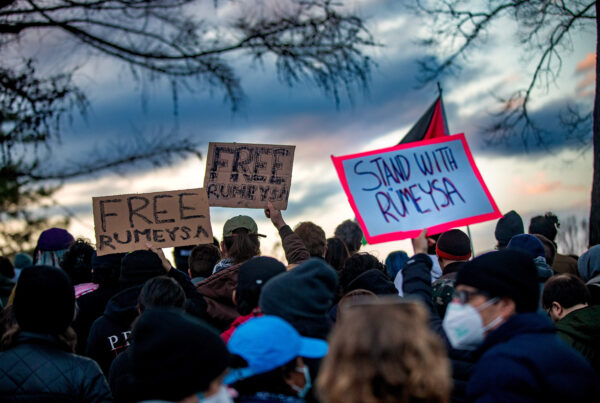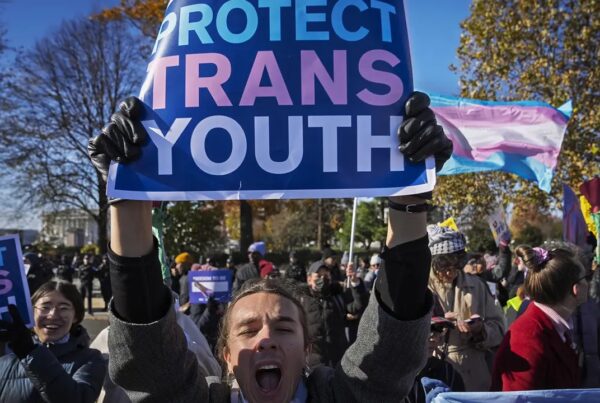By Diane Wong
December 22, 2020
The national amount of student loan debt has grown exponentially over the decade, from $830 billion in 2010 to over $1.6 trillion this past year. In an era where universities function increasingly like private businesses, higher education has become a form of entrapment. There are over 40 million people in the country living with student loans, making it one of the largest forms of consumer debt — even higher than credit cards and auto loans. According to recent GenForward data, pluralities of youth across the board live with student debt, including 41% of Black youth, 31% of Asian youth, 31% of Latinx youth, and 37% of white youth. While conversations around student loan debt reform have only recently made it to national headlines, the reality is that debt has already shaped the daily lives of millions across generations.
Youth of color are more likely to struggle with student debt and to be stuck in a vicious cycle of economic precarity, distress, and trauma than their white counterparts. Recent studies have shown that student loan debt delinquency is correlated to majority Black and Latinx neighborhoods in cities like Philadelphia, New York, and San Francisco. In fact, Black youth take on 85% more debt than white students, a disparity that is compounded each year by punitive laws regulating student loans so that the balance owed becomes higher than the amount initially borrowed. Genforward data reveals that Black and Latinx youth are also less likely to receive support from parents to help pay student debt — 42% of Black youth and 50% of Latinx youth said it is unlikely for their families to help pay student debt as compared to 34 percent of Asian and white youth who responded the same.
This kind of fiscal entrapment makes higher education one of the largest contributors to racial inequality, placing the lives of Black and Latinx youth in perpetual deferment. GenForward data on education indicate that the lives and livelihoods of Black and Latinx youth are contingent on debt. Of those who answered that they struggle with student debt, 35% of Black youth and 28% of Latinx youth have more student debt than is manageable as compared to 16% of Asian youth and 22% of white youth. This debt has caused delays in life events, 33% of Black youth and 34% of Latinx youth have delayed buying a home due to debt. In addition, 28% of Black and Latinx youth have been unable to continue with their education due to debt. Other aspects of life deferred include having children, saving for retirement, and getting proper health care.
While student debt abolition has recently made it to headlines and elections debates largely due to the persistence of Democratic presidential candidates Elizabeth Warren and Bernie Sanders, these demands have long been pushed by the communities most directly impacted by the debt crisis. The Black Liberation Collective, led by Black students across the country dedicated to transforming higher education through coalition building, direct action, and political education, released a public list of student demands based on institution. Of the demands include cancelling student debt and “the elimination of tuition and for an immediate moratorium on tuition and fee increases, decreases until all students are graduating without student debt, and the establishment of financial aid that is loan-free and labor-free.” GenForward data reflects this view with support across the board, 79% of Black youth, 73% of Asian youth, 76% of Latinx youth and 64 % of white youth support tree tuition at public colleges and universities.
While President elect Biden has the ability to cancel student debt through executive order we must keep in mind that this is only the first step of many changes that need to be made to combat the predatory practices of modern universities. The current health crisis has revealed how broken and unsustainable American higher education has become, and the need for radical alternatives that include addressing generational harm, trauma, and healing from the structural violences of academic institutions. It demands universities to remove cops from campuses, to divest from prisons, to lead the way on reparations, to offer free tuition for Black and Indigenous students, to commit to land repatriation, and so much more. Let’s hold close what bell hooks once wrote “education was about the practice of freedom,” and commit to the visionary work that will bring us closer to freedom.
The GenForward Survey is associated with the University of Chicago. August 2020 responses were collected July 24th, 2020 through August 6th, 2020, among a nationally-representative sample of 3,115 young adults between the ages of 18 and 36. The overall margin of sampling error is +/- 2.54%.
Diane Wong is an Assistant Professor in the Department of Political Science at Rutgers University, Newark. Her interests include American politics, Asian American activism, gender and sexuality, comparative immigration, race and ethnicity, cultural and media studies, and community rooted research. As a first-generation Chinese American born, raised, and based in Flushing, Queens in New York City, her research is intimately tied to the Asian diaspora and urban immigrant experience. Her work has appeared in Urban Affairs Review, Women’s Studies Quarterly, Amerasia Journal, Asian American Policy Review, and a variety of edited book volumes, journals, anthologies, podcasts, and exhibitions. Diane is a socially engaged artist and organizer, she is co-founder of The W.O.W. Project, a youth-led initiative based out of Wing On Wo & Co. the oldest store in Manhattan’s Chinatown that uses art activism to combat gentrification. Learn more about Diane & the GenForward researchers here.
More Perspectives



